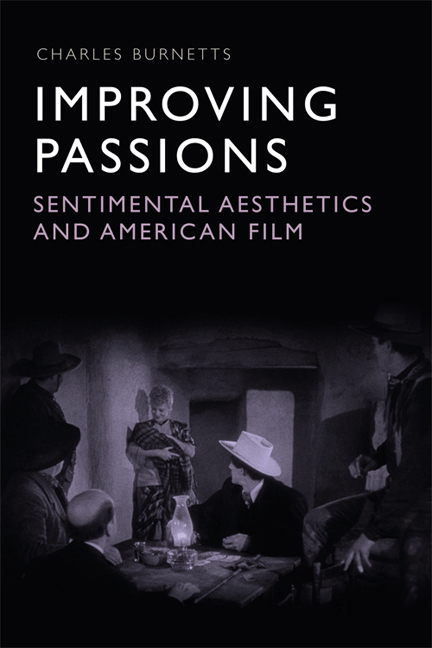Book contents
- Frontmatter
- Contents
- Acknowledgements
- Introduction
- 1 Towards a Genealogy of Sentimentalism in the Eighteenth and Nineteenth Centuries
- 2 Sentimental Aesthetics and Classical Film Theory
- 3 The Sentimental Chaplin: Comedy and Classical Narrative
- 4 Affect, or Postmodern Sentimentalism
- 5 The Sentiments of War in Spielberg and Tarantino
- 6 Sentiment and the ‘Smart’ Melodrama
- Conclusion
- Bibliography
- Index
4 - Affect, or Postmodern Sentimentalism
Published online by Cambridge University Press: 20 December 2017
- Frontmatter
- Contents
- Acknowledgements
- Introduction
- 1 Towards a Genealogy of Sentimentalism in the Eighteenth and Nineteenth Centuries
- 2 Sentimental Aesthetics and Classical Film Theory
- 3 The Sentimental Chaplin: Comedy and Classical Narrative
- 4 Affect, or Postmodern Sentimentalism
- 5 The Sentiments of War in Spielberg and Tarantino
- 6 Sentiment and the ‘Smart’ Melodrama
- Conclusion
- Bibliography
- Index
Summary
In the above chapters, sentimentalism has been examined as a concept or mode of considerable importance to classical and contemporary film theory and criticism, one that has undergone radical shifts in meaning and value in its history of deployment, while remaining in common usage to the present in both popular and critical discourse. The key development concerns its shift from a denotative to a connotative status, from a term that maps out a new philosophy of ethics driven by an optimum balance between ‘reason’ and the ‘passions’, to one that struggles to escape connotations of ‘gross sentimentality’ – the excessive affectivity of the subject, the abuses of idealisation, and the related problematic of kitsch. At the same time, our examination of the positions of various writers reveals a deep concern about emotion and subjectivity at the cinema, and an awareness of its conceptual negotiation of melodrama and the sentimental novel. For many of them, cinema is unparalleled in its capacity to move us, albeit owing to formal elements of the medium, and/or rhetorical patterns, that are not agreed upon.
Such fascination concerning the interplay of texts and emotion has more recently come centre stage with a more broadly renewed emphasis on the body, emotion, and ‘affect’ in the humanities. As with the film scholarship analysed above, the role of sentimentalism in this field of enquiry is highly contested, something that this chapter seeks to examine and elucidate from the standpoint of both critical theory and contemporary film theory, in order to highlight the significance of its rhetorical address to the reception of various post-classical films examined in the chapters to follow. ‘Affect theory’, or more commonly ‘affect’, and the approach to emotion and textuality it signifies, is grounded indeed in a revisionism concerning the ‘depth model of truth’ (Best and Marcus 2009: 10) inherited from various critical models inspired by Freud and Marx, particularly hermeneutics, where critical work is predicated on the revelation of hidden truths that lie behind the ‘surface’ of texts.
- Type
- Chapter
- Information
- Improving PassionsSentimental Aesthetics and American Film, pp. 99 - 126Publisher: Edinburgh University PressPrint publication year: 2017

